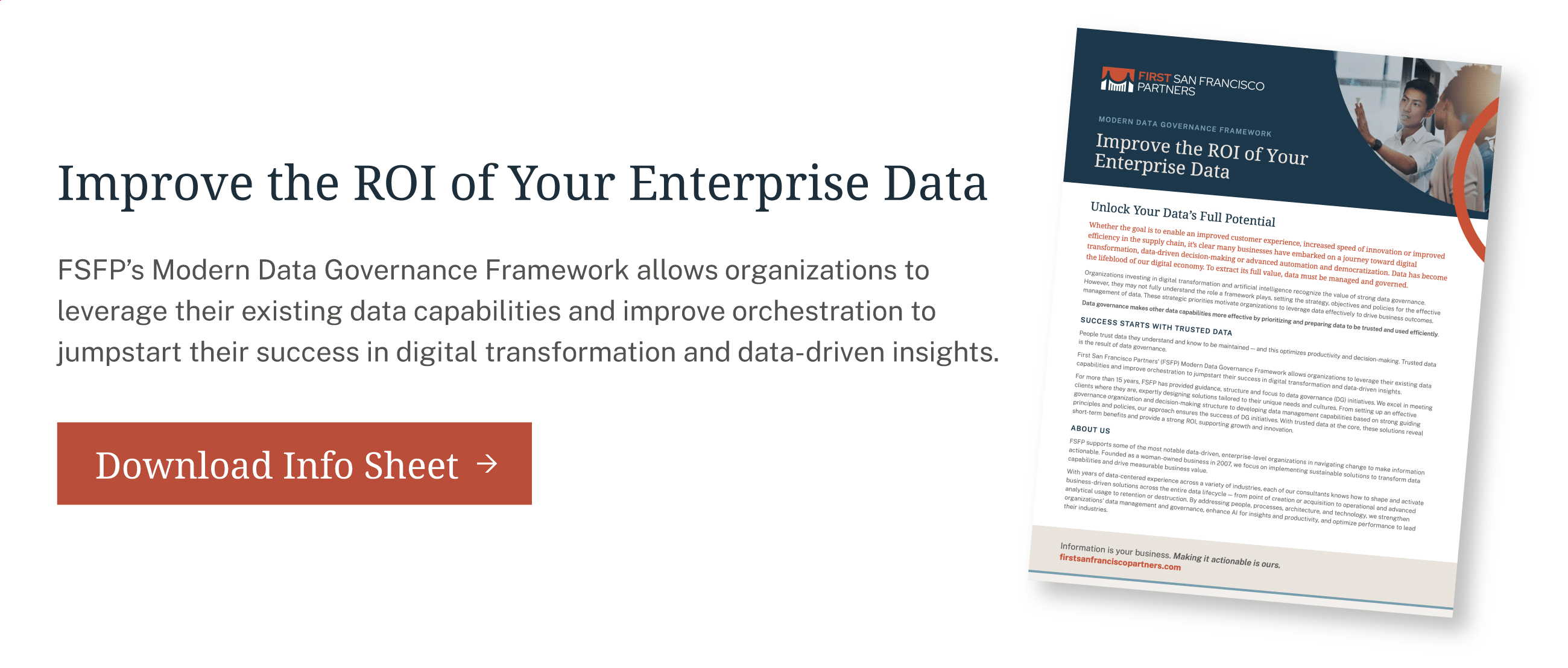Last week, Kelle O’Neal joined five governance industry professionals who presented at Enterprise Data Governance Online. EDGO, an annual event from DATAVERSITY, just marked its fifth year.
This popular, free event offers a full day of live webinar sessions. EDGO 2020’s attendance was projected to be about 5,000 people from across the globe, representing all levels of data management experience.
Next-Generation Data Governance
If you couldn’t join EDGO, you can still register to get access to the recorded online sessions.
Data governance is by no means a new practice — it's a constantly evolving one. Today, the drivers for #datagovernance look very different from 10 years ago, even from five years ago. @kellezoneal #datagovernance #EDGO Click To TweetHere are key takeaways from Kelle’s Next-Generation Data Governance presentation.
Evolution of Data Governance
- Data governance is by no means a new practice — it’s a constantly evolving one. Today, the drivers for data governance look very different from 10 years ago, even from five years ago.
- There will always be new drivers for data governance. Some of the newer drivers are based on regulatory changes connected to data privacy and the sentiment of organizations’ customers or consumers. Last year, we saw the increase of data ethics as a driver, where it moved beyond privacy and privacy compliance and into driving consistent behavior in an ethical framework.
- While drivers may change and evolve, the goal and purpose of data governance should continue to be about improving the organization; for example:
- Providing trusted data internally to create data-driven insights, as well as externally to regulators, clients, vendors, partners and suppliers.
- Data that drives key business initiatives, including digital transformation — something that’s top-of-mind for many executives across all industries.
- The creation of guidelines, directives and other practices to support data-related activities that drive business impact.
- A focus on master data management, metadata management and/or augmented analytics (i.e., whatever align with an organization’s focus and priorities).
Operating Models to Address Organizational Demand
- Data governance operating models traditionally focused on councils and committees that provided top-down guidance and approvals of policies and processes. Today’s requirements for agility and speed of delivery, coupled with improved technology, are challenging traditional models and their relevance and utility.
- Data governance operating models need to:
- Ensure ongoing alignment to business value
- Embed best practices for the enterprise
- Identify support and staffing needs
- Enable decision-making (tactical/management/strategic)
- Be cross-functional and cross-divisional
- Include all stakeholders
- There are new and emerging organizational roles that have a connection to operating models, including Chief Analytics Officer, Data Acquisition Lead, Data Governance Services Lead, Data Operations and Data Ethics Lead.
Data Privacy and Ethics
- Data privacy is here to stay. The privacy law landscape continues to expand and evolve, and U.S. state-level momentum is at an all-time high.
- Data governance must be involved in each organizational project that uses data to ensure compliance with privacy standards.
- Create a culture of data privacy by educating people on how to integrate privacy practices into all data management activities, data sharing and data usage.
- Because organizations collect personal data at every customer touch point, ethics are particularly important in data management and data governance efforts.
How a Data Catalog Facilitates Data Governance
- Today’s data catalogs offer great value to organizations. They not only include information about who created the data and who uses it, they also can be used to share information on privacy regulations, ethics policies and other data guidelines. Many also include crowdsourcing aspects where users can contribute metadata about a data set (how it’s best used, the content, whether it’s trusted and of high quality, etc.).
- Data catalogs can also be used as repositories for commonly used queries and database query logs, and as report catalogs. This helps people avoid recreating reports that already exist.
- Similar to business glossaries, data catalogs store usage data so it can be mined and analyzed to understand who is using what, when and how. These usage analytics, when combined with data categorizations, can help organizations understand data usage by category and what governance activities to prioritize.
- A modern data catalog, with its ability to “govern data at the point of use,” helps support data needs across the organization.
Next-Generation DG Takeaways
To hear Kelle’s full remarks on the Next-Generation Data Governance session from EDGO, be sure to register for the recorded sessions.
In the meantime, here are Kelle’s closing remarks from her 50-minute session:
- If you’re not sure where to begin or improve your governance efforts, focus on high-value, high-impact data domains.
- Tie your efforts back to the organizational structure and select the best-fit model: centralized or decentralized, networked, federated, hybrid or agile. Take into account organization complexity + maturity, domain complexity + maturity and scalability.
- Although related, data privacy and data ethics should be considered separately. Having a strong data privacy and data ethics culture is a competitive value to many customers and consumers.
- The addition of the data catalog to your metadata arsenal will expand your governance reach. Tools need to be governed just like the data; define a metagovernance process while you are implementing the solution.
EDGO 2021
If you like to plan ahead, you’ll want to make note that DATAVERSITY’s next EDGO event is January 27, 2021.



